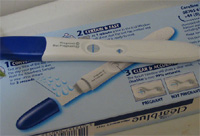Pregnancy Warning Signs: What To Look Out For
 How do you know the difference between when you should call your doctor at 3am or when the pain/symptom which has been keeping you awake for the last 3 hours is normal?
We take a look at some of the most common symptoms of possible pregnancy complications that should not be ignored. Remember though, that just because a symptom is not on the list doesn’t mean you shouldn’t call your health care provider. If you are unsure, or if you can just feel that something is not right it is often best to be safe than sorry.
Something else which you may want to do at one of your earlier prenatal checkups is to sit down with your health care provider and ask him/her which signs you should be keeping a look out for that may require urgent attention.
How do you know the difference between when you should call your doctor at 3am or when the pain/symptom which has been keeping you awake for the last 3 hours is normal?
We take a look at some of the most common symptoms of possible pregnancy complications that should not be ignored. Remember though, that just because a symptom is not on the list doesn’t mean you shouldn’t call your health care provider. If you are unsure, or if you can just feel that something is not right it is often best to be safe than sorry.
Something else which you may want to do at one of your earlier prenatal checkups is to sit down with your health care provider and ask him/her which signs you should be keeping a look out for that may require urgent attention.
- Vaginal bleeding or spotting. While spotting is a fairly common experience during the early stages of pregnancy, it can defiantly leave you feeling a little concerned. In most cases light or brown spotting is a normal pregnancy symptom, however, if the bleeding is bright red or has clots, you must contact your health care provider ASAP.
- Should you feel that your baby is not moving as much as he/she usually does – once your babys movement becomes more regular and easy to feel – then you should speak with your health care provider about counting your babys kicks.
- An increase in vaginal discharge or a change in the type of discharge — that is, if it becomes watery, mucousy, or bloody (even if it’s only pink or blood-tinged). Note: After 37 weeks, an increase in mucus discharge is normal and may indicate that you’ll be going into labor soon.
- Pelvic pressure (a feeling that your baby is pushing down), lower back pain (especially if it’s a new problem for you), menstrual-like cramping or abdominal pain, or more than four contractions in an hour (even if they don’t hurt) before 37 weeks.
- Painful or burning urination, or little or no urination – as this can usually be an indication that you have developed a bladder or a yeast infection. Bladder infections are actually the most common pregnancy complication, and it is important that your health care provider confirms the prognosis and treats it appropriately.
- Visual disturbances such as double vision, blurring, dimming, flashing lights, or “floaters” (spots in your field of vision). These are usually signs of more serious complications and it is vital that your health care provider finds the source of the problem quickly to ensure that safety of you and your baby.
- While headaches during pregnancy are another common symptom many pregnant women suffer from, they may also be an indication that there is some other problem at hand. If your headaches are accompanied by blurred vision, slurred speech, stiff neck or numbness then contact your health care provider.
- Severe or persistent vomiting, or any vomiting accompanied by pain or fever or chills or fever of 100 degrees Fahrenheit or higher.
- Any swelling in your face or puffiness around your eyes, anything more than a little swelling in your hands, severe and sudden swelling of your feet or ankles, or a rapid weight gain (more than 4 pounds in a week). This is usually a sign that you may be suffering from edema.
- Constant or severe leg cramp or calf pain that doesn’t ease up when you flex your ankle and point your toes toward your nose or when you walk around, or if your one leg is significantly more swollen than the other.
- Any trauma to your stomach area can harm your baby or cause the placenta to detach from the uterus wall, so should anything happen to you around the stomach area, contact your health care provider ASAP.
- While it is normal to experience itchy skin while pregnant, especially around the breasts and stomach, persistent and intense itching of your torso, arms, legs, palms, or soles, or a feeling of itchiness all over your body is not. This could be an indication that you may have a rare symptom called PUPP.
- Fainting, frequent dizziness, a rapid heartbeat, or heart palpitations are all warning signs that you should not ignore. Although in most cases it could be because you haven’t eaten enough, or you may be dehydrated, it could howver also be a sign that you may have anemia, hypotension or any other related issue, and it is best to have your health care provider check you over.
- While most pregnant women find is difficult to breathe, especially in their third trimester, if it is associated with chest pains or coughing blood then you definitely should check in with your heath care provider.
- Constipation and pregnancy do, unfortunately, go hand in hand in many cases. Hormones, what can you do? Severe constipation on the other hand, especially if it is accompanied by abdominal pain or severe diarrhea that lasts more than 24 hours is not normal. Call your health care provider if this is the case.
 Remember! Just because a pain or symptom is not on the list, do not think that it means you shouldnt call your health care provider. It is always better to safe than sorry.
Remember! Just because a pain or symptom is not on the list, do not think that it means you shouldnt call your health care provider. It is always better to safe than sorry.Warning Signs


